Mama always said that everything started the day they came for Nkadi, her firstborn, the golden leopard of our family. My twin, Jayaike, would disagree—he says it started beforewe were even born, that it started with the Split, the great breaking of the earth—that it started with the war. This was the kind of thing he said quietly, when we were lying in our bed with our legs thrown over each other, whispering under the heaviness of night. In our town, talking about the Split is not something you do when the sun has woken up, or in places where ears can hear you. In fact, left to me, I wouldn’t be talking about the Split at all. It’s so far away from us in time, what can it matter now? The past has happened; leave it alone.
Jayaike says I sound like Mama when I say things like that, as if I’m afraid of looking over my shoulder. Maybe he’s always been the brave twin—after all, he’s the one who used to catch our grandmother Ahụdi on the moonlit nights when he knew she wouldn’t refuse us stories. That’s when he’d ask her about the Split, and the Starvation War, and her husband, Kesandụ, our dead grandfather. Since
Jayaike is one ear and I am the other, I always listened to the stories, even when some of them turned into streams from her eyes, even when they hurt her. Jayaike would press his mouth to Ahụdi’s hand when this happened, but I could have told him he didn’t have to worry. Our grandmother never stopped a story just because it was breaking her heart.
Ahụdi told us things they refused to teach us in school, things that Papa pretends not to hear when you ask him, things that Mama will slap you for even bringing up. I’m not the only one who doesn’t like to talk about the past—I learned it from somewhere, but my twin challenges the silence I want. Jayaike and I can’t tell other people the things Ahụdi tells us, that’s how heavy they are. I tried it once with one of our teachers, when I thought I could be brave like my brother. I told the teacher that she was wrong, that war was never necessary and it was certainly not noble, not when so many people died. The
teacher didn’t even allow me to finish class. She sent me home immediately with a warning, and Mama shouted at me, told me I shouldn’t be contradicting my elders. This was part of how I learned to be quiet.
When I told Ahụdi, she just shook her head. “Some people don’t want to hear true things, Sọmadịna. You have to be careful which air you speak it into.”
In school, they tell us things as if they’re true. They tell us that nothing happens beyond the Split, the yawning chasm that breaks our islands away from any other part of the world. And even if it did, they add, it is impossible to cross the Split, so why disturb yourself with this nonsense? All we need to know, the teachers say, is that the Split ended the Starvation War, that we lost hundreds of dịbịas, and that we are now free because of it.
It was Ahụdi who told us about the decision the dịbịas made to create the Split, when too many children had swelled and died of hunger, when the war was a mad thing rampaging through our land. The dịbịas had always been our masters of medicine and spirit, our guides to the primordial mother, the deity Ala. She was the earth, the underworld, the sacred crocodile crawling up the banks of the river, and we were her children, two- legged and fumbling on land. The dịbịas were responsible for us; they could not fail. Our grandfather Kesandụ had been one of them.
“We tried to keep magic out of the war,” my grandmother explained. “It is always too dangerous. One person brings their magic and another brings a more powerful one, and the next thing you know, there is no land left to even fight over and who is going to explain that to the deity?” Ahụdi folded her legs on her mat, and in the hushed evening, our little fire threw sheets of light across her face. Jayaike and I were roasting cashews in the coals, our eyes wide as we ate our grandmother’s story.
“Magic can remove everything,” she told us. “It can remove everything you have ever loved or wanted or seen. Like that!” She snapped her fingers sharply, and we jumped in alarm. The night felt wide and dark at my back. I tried to imagine our compound being removed, Mama and Papa gone like a snap, let alone the whole of our town, the thick forests that encircle us, the water past the forest. It was beyond the stretch of my mind, but I believed our grandmother. Jayaike and I always believed our grandmother. She told us that the war started because when we were all one land, our neighbors got greedy and tried to take our land from us. We fought back, but our enemies poisoned the waters of our rivers and destroyed our crops and livestock until our people were dying of hunger. That’s why it’s called the Starvation War, for the bodies of children floating black in our dead rivers. The crocodiles ate the corpses and blasphemy lived everywhere. The dịbịas decided that in order to save us, they would have to break the earth and invite in the sea to separate us from those who were killing.
“What if we had all drowned?” I once asked Ahụdi. “When the water came in.”
She had held my hands and smiled. “Then we would still be free,” she replied. “We would still be free.”
***
The Split changed everything in our history, but to understand what our world became, you have to understand what our world was before. I wish I could imagine it, but all I had were fragments of stories from Ahụdi, whispers of truth in what they told us at school, and it wasn’t enough to put together a correct picture. What I know is that we were always a powerful people, some of us with gifts from the mother deity. That is what we called magic, when the deity touched you, when a piece of the spirit world found its way into your flesh and gave you an ability beyond what was normal, the tooth of the crocodile working its way under your skin. The Split changed all of that.
When the dịbịas broke the earth, one of the deity’s bodies, it caused a ripple of power beyond anything that had been seen before or since. The land shattered into islands, and our enemies fell into the water, where if they didn’t die in the crocodiles’ jaws, they drowned. Magic tore through the air, far too much of it, and it clawed its way through our towns and villages like a god’s rampaging anger. It was as if we had angered Ala by breaking the earth and in return she suffocated us with gifts, those abilities we used to pray for; she forced them down our throats. Not everyone can survive being touched by a god, and a person can only hold one gift at a time, except for the dịbịas, who can hold several. So, if you already had a gift before, either your body closed itself off to refuse the influx of magic, or you died.
If you didn’t have a gift and lacked the capacity to hold one, you died. It didn’t matter if you were young or old, sick or healthy, you died. Infants, elders, the strong and the weak—they were all reduced to one thing: if their spirit could handle the deity’s hand.
Ahụdi said this is what war did, it killed people from start to finish; it killed people in consequences that don’t pay attention to time. When the shock wave from the Split had passed, everyone on our island had gifts—at least, everyone who was still alive. I never knew if we used to be many more than we are now. I just knew that everyone in the world I was born into had a gift, a blessing bitten into us by the unforgiving jaw of a god, and it would never leave our lineage. It passed on through the blood, to the children, and their children, and in this way, we belonged wholly to the mother deity, the survivors scarred with her heavy favor. My grandmother was a healer, and she never forgot what that wave of magic did to our people, both those it killed and those who had the magic forced on them. She knew how a god’s touch can ravage your flesh, and she told my twin and me how no one goes near the Split till today. It lies somewhere beyond our sight, abandoned and unknown.
—
Excerpt from SOMADINA published by Knopf Books for Young Readers. Copyright © 2025 by Akwaeke Emezi.
Pre-order a copy of the book here!




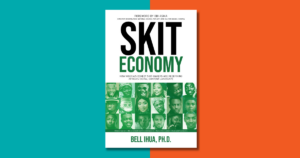
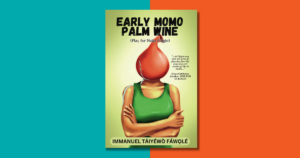
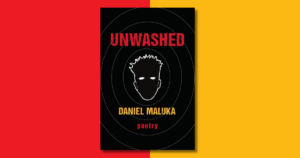
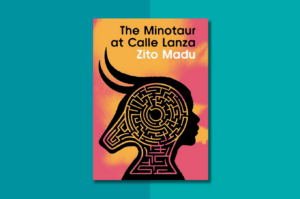
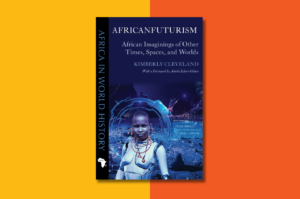

COMMENTS -
Reader Interactions